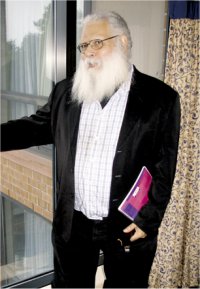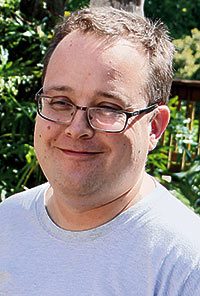Samuel R. Delany: The Grammar of Narrative

Samuel R. Delany grew up in Harlem in a middle-class black family, and attended the prestigious Bronx High School of Science before going on to City College. He never graduated, though today he’s a tenured English professor and Director of the Graduate Creative Writing Program at Temple University.
His first novel The Jewels of Aptor (1962) appeared when he was 20. The Fall of the Towers trilogy — Captives of the Flame (1963), The Towers of Toron (1964), and City of a Thousand Suns (1965) — followed before his twenty-second birthday. Other works from the ’60s include The Ballad of Beta-2 (1965), Empire Star (1966), Nebula Award winners Babel-17 (1966) and The Einstein Intersection (1967), and Nova (1968). These novels, along with several short stories, resulted in Delany’s recognition as one of the brightest talents of SF’s New Wave. He also won a Nebula Award for short story “Aye, and Gomorrah…” (1967); “Time Considered as a Helix of Semi-Precious Stones” won both a Nebula and a Hugo in 1970. Other notable stories include Nebula finalists “Driftglass” (1967) and “The Tale of Gorgik” (1979), Hugo finalists “The Star Pit” (1967) and “Prismatica” (1977), and Nebula and Hugo finalist “We, in Some Strange Power’s Employ, Move on a Rigorous Line” (1968).
In the ’70s his output dropped off, though he published Dhalgren (1975) and Triton (1976), and edited with then wife Marilyn Hacker four-volume anthology series Quark (1970–71). SF novel Stars in My Pocket Like Grains of Sand appeared in 1984, but most of the decade was dedicated to his ambitious sword-and-sorcery series Return to Nevèrÿon, a collection of 11 linked stories and novels collected in four volumes: Tales of Nevèrÿon (1979), Nevèrÿona (1983), Flight from Nevèrÿon (1985), and Return to Nevèrÿon (The Bridge of Lost Desire) (1987). His last genre novel was fantasy adventure They Fly at Çiron (1993), though forthcoming novel Through the Valley of the Nest of Spiders, due out from Alyson Books in November 2010, contains elements of science fiction as well as gay erotica.
During the ’70s and ’80s years he turned increasingly to literary criticism and the study of semiotics, producing numerous non-fiction books on those and other subjects, including The Jewel-Hinged Jaw (1977), The American Shore (1978), The Straits of Messina (1989), Starboard Wine (1985), and Longer Views (1996). His memoir on “East Village Sex and Science Fiction Writing”, The Motion of Light in Water , won the 1989 Hugo for best non-fiction. Silent Interviews: On Language, Race, Sex, Science Fiction, and Some Comics (1994) was a Hugo finalist, as was About Writing: 7 Essays, 4 Letters and 5 Interviews (2006), which collects some of his writing advice and philosophy.
His short fiction has been gathered in Driftglass (1971), Distant Stars (1981), The Complete Nebula Award-Winning Fiction (1986), Driftglass/Starshards (1993), Atlantis: Three Tales (1995, recently re-released in a corrected third printing by Wesleyan University Press), and Aye, and Gomorrah (2003).
Non-genre works of note includes psychological thriller The Mad Man (1994); pornographic novel Hogg (1995); and Dark Reflections (2007), about an aging gay African-American poet in New York City, which won a Stonewall Book Award for 2008 and was a runner-up for the Lambda Literary Book Award.
Delany won a Pilgrim Award for his scholarship in 1985, was a Worldcon guest of honor in 1995, and was inducted into the Science Fiction Hall of Fame in 2002. He has received numerous life achievement awards from organizations honoring gay and lesbian writing, and he was the subject of documentary film The Polymath, or, The Life and Opinions of Samuel R. Delany, Gentleman (2007), which tied for the jury award for best documentary at the International Philadelphia Lesbian and Gay Film Festival.
Delany traveled extensively in the ’60s, spending months in Turkey and Greece, and he lived in San Francisco and London before returning to New York. He began teaching in 1975 at the University of Buffalo, and also taught at the University of Wisconsin and Cornell University before spending 11 years as a professor of Comparative Literature at the University of Massachusetts, Amherst. Since 2001 he has been a professor of English and Creative Writing at Temple University in Philadelphia. His marriage to Marilyn Hacker began in 1961, with an amicable divorce in 1980. They have an adult daughter, Iva Hacker-Delany.
Excerpts from the interview:
“For the last decade I’ve been teaching at Temple University, as Professor Delany of English and Creative Writing. I really didn’t think it would come to that! But now I’ve become fat and comfortable with a monthly paycheck. (Capitalism can be really evil. I know from firsthand experience.)
“From where I sit, I see the remnants — dare I say the dregs — of High Modernism being protected in a way that I don’t know whether it’s all that productive or not. With my classes, I try to use the Clarion/Milford model. Sometimes it works, and sometimes it doesn’t. I consider myself genre-friendly, although I’m one of those people who keep saying to the kids that want to write science fiction, once they have proven themselves absolutely incompetent to write it, ‘Why don’t you try to write something a little simpler first?’
“Most of the time, those failed attempts come from their not knowing their way around English or basic narrative strategies — what I would call the grammar of narrative. If you write a page-and-a-half about somebody doing something and we don’t know where you are or what you are doing yet, usually that’s a sign of narrative incompetence of some sort; or the writer simply hasn’t thought about how to tell a story.
“Writing good science fiction is more complex and more difficult than writing a relatively straightforward account of someone getting up in the morning, making a cup of coffee, going to the bathroom, and getting out of the house. You have to be able to describe that in a familiar earthbound kitchen before you can describe it on a spaceship in free fall.”
*
“I’ve finished another novel. Basically I’m very happy with it. The working title is Through the Valley of the Nest of Spiders. I have been working on it for the last five years, and a section of it was published a couple of years ago in a journal called Black Clock. Now it’s finished, it’s over 250,000 words long. In one sense, it’s an attempt to write a book that sits — formally, almost — on the three-way genre boundary between literary impressionism, pornography, and science fiction. (I think you should use the conservative term, pornography; ‘erotica’ sounds too much like you’re embarrassed about what you’re doing, and I’m not.) It’s about a working-class gay male couple who meet when they are teenagers (19 and 17), living very much out of the center of things somewhere on the Georgia coast. They meet in 2007, and spend the next 75 or 76 years together, till one of them dies. And not much else happens.”
*
“When I talk to people with MFAs who are now working as editors for literary publishers, they say, ‘What we learned in college is a kind of writing that our current bosses do not want to let in the door.’ They want nothing to do with ‘good writing.’ These are places like Random House; Harcourt Brace; Knopf; and Farrar, Straus & Giroux, who are the epitomes of literary publishing in this country, yet they’re willing to say, ‘I’m sorry. That’s not what we’re interested in anymore. We have a couple of slots a year for novels like that.’
“This is not a healthy situation for writing in general. It’s not healthy for science fiction, not healthy for anyone. I think we have five publishers left in New York, and 25 years ago there were 79! So when we’re talking about ‘commercial’ versus ‘art’ publishing, we’re using a leftover vocabulary. We’re still looking at the world through 1955-colored glasses.”
This review and more like it in the March 2010 issue of Locus.
 While you are here, please take a moment to support Locus with a one-time or recurring donation. We rely on reader donations to keep the magazine and site going, and would like to keep the site paywall free, but WE NEED YOUR FINANCIAL SUPPORT to continue quality coverage of the science fiction and fantasy field.
While you are here, please take a moment to support Locus with a one-time or recurring donation. We rely on reader donations to keep the magazine and site going, and would like to keep the site paywall free, but WE NEED YOUR FINANCIAL SUPPORT to continue quality coverage of the science fiction and fantasy field.





